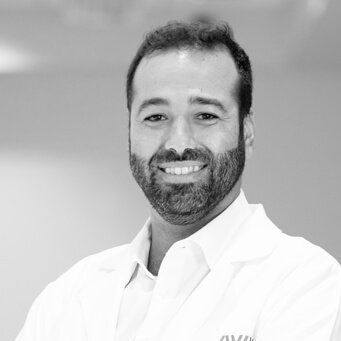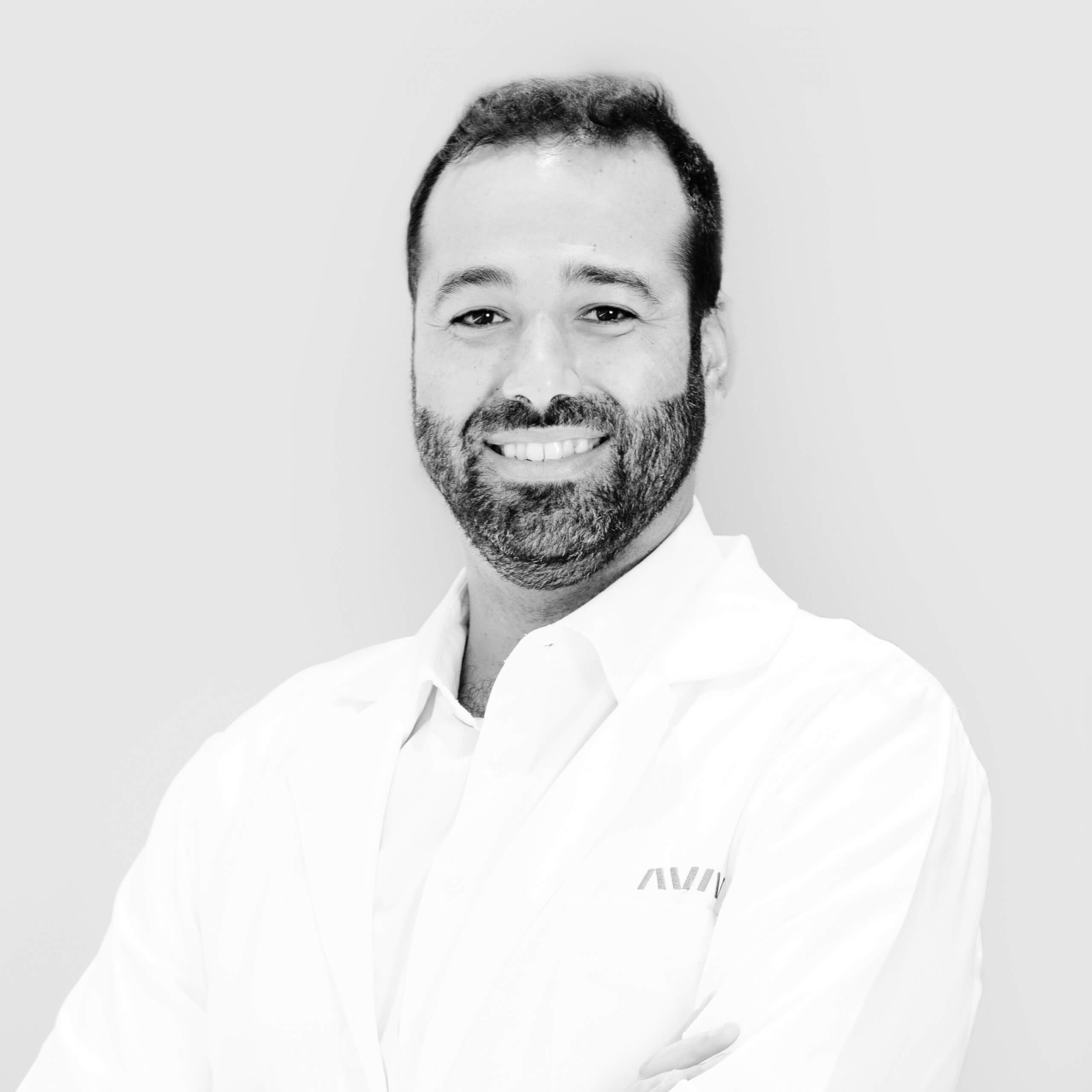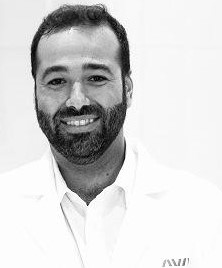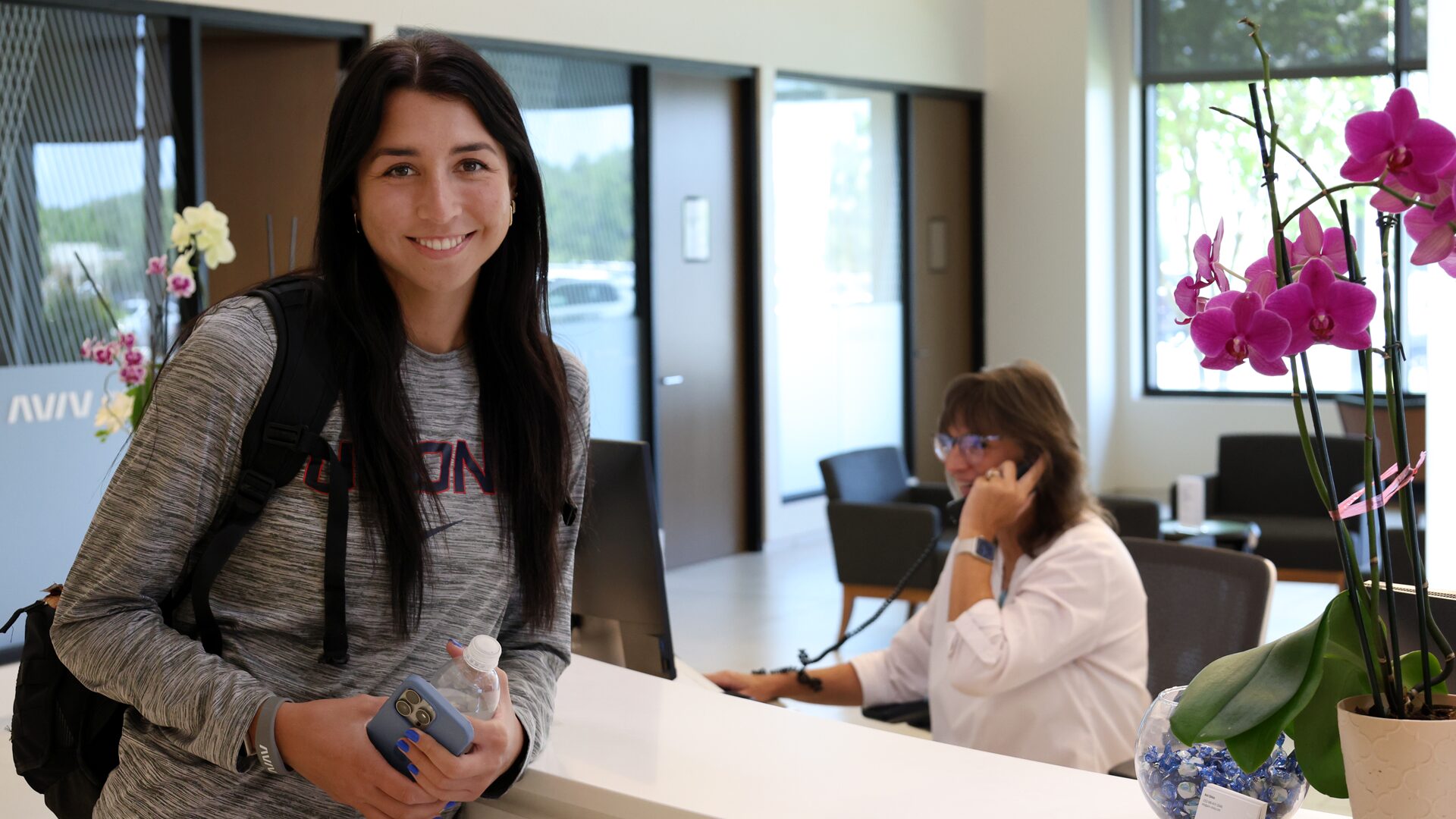
How Caroline Ducharme Overcame Chronic Post-Concussion Syndrome and Returned to Championship Basketball


When the final buzzer sounded in the University of Connecticut’s victory in the 2025 NCAA Women’s Basketball National Championship, one of Caroline Ducharme’s lifelong dreams finally came true. She was a national champion.
But not long ago, Ducharme’s lifelong dreams were in jeopardy. She feared she would never play at an elite level again, lift a national championship trophy, or pursue her goal of a career in pro basketball. It took nearly two years of setbacks, countless therapies, and unanswered questions before Caroline finally found her path back to the court at Aviv Clinics.
When Concussions Won’t Heal: Caroline Ducharme’s Struggle
After suffering multiple on-court concussions, Caroline developed persistent post-concussion syndrome (PCS). Her lingering symptoms included constant headaches, sensitivity to light and noise, blurred vision, problems with memory and concentration, and difficulties with balance and coordination. Despite the support of UConn’s athletic staff and countless specialists, Ducharme’s concussion symptoms forced her to miss more than 60 games.
Her future felt uncertain.
“I remember just like breaking down… like, this is never going to get better,” Ducharme recalls. She thought, “I’m going to be stuck like this. And I don’t see the point in getting better if I’m never going to play basketball again.”
Unfortunately, Caroline’s experience is not uncommon. Research shows that as many as 30% of people with a concussion will develop chronic post-concussion symptoms that persist for months or even years. This daily struggle can disrupt school, work, relationships, and the ability to live a full life.
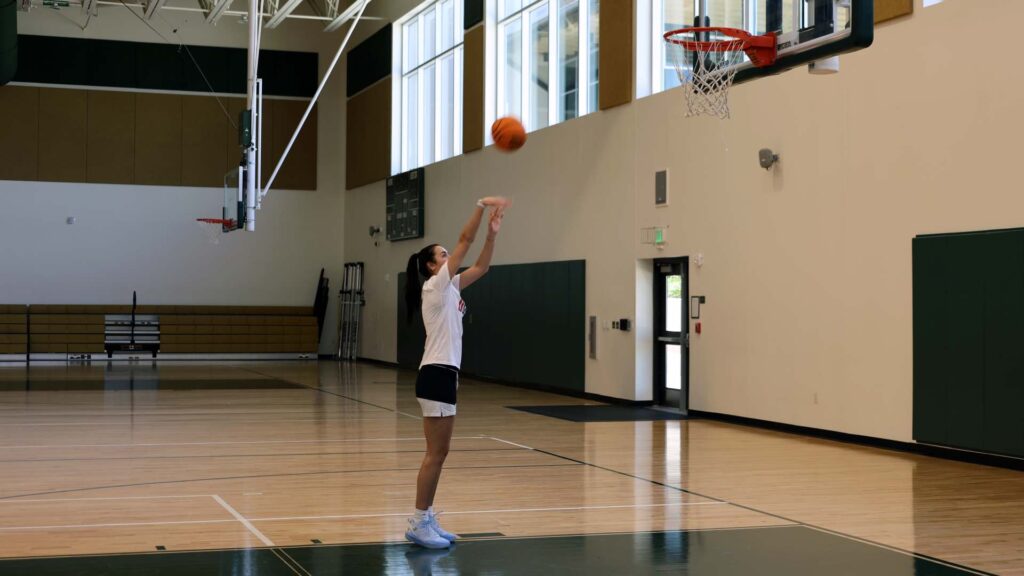
After more than a year of heartbreak and frustration, Caroline and her family decided to explore a new path: treatment for post-concussion syndrome at Aviv Clinics. What happened next changed the course of both her basketball career and her life.
What Is Post-Concussion Syndrome — and Why Is It So Hard to Treat?
For most people, concussion symptoms gradually subside over the course of a few weeks. But for some like Caroline Ducharme, these symptoms persist and evolve into post-concussion syndrome (PCS).
PCS is a complex neurological disorder in which the brain doesn’t fully recover from its injury. People with PCS may experience a mix of symptoms that linger for months or even years, including:
- Recurring Headaches and migraines
- Dizziness and balance issues
- Mental fatigue, brain fog
- Cognitive challenges including memory problems and attention issues
- Sleep disruptions (insomnia or sleeping too much)
- Emotional symptoms such as depression, anxiety and mood swings.
These symptoms and others often fluctuate, intensify with activity, and resist traditional treatment.
While many therapies for PCS and mild traumatic brain injuries (TBIs) focus on managing symptoms, few address the underlying disruptions in brain function. Studies suggest that lingering concussion symptoms may result from impaired blood flow and oxygen delivery in the brain — disrupting the brain’s ability to function and heal. Standard imaging tests like CT scans and MRIs can miss these subtle changes.
What Is Post-Concussion Syndrome — and Why Is It So Hard to Treat?
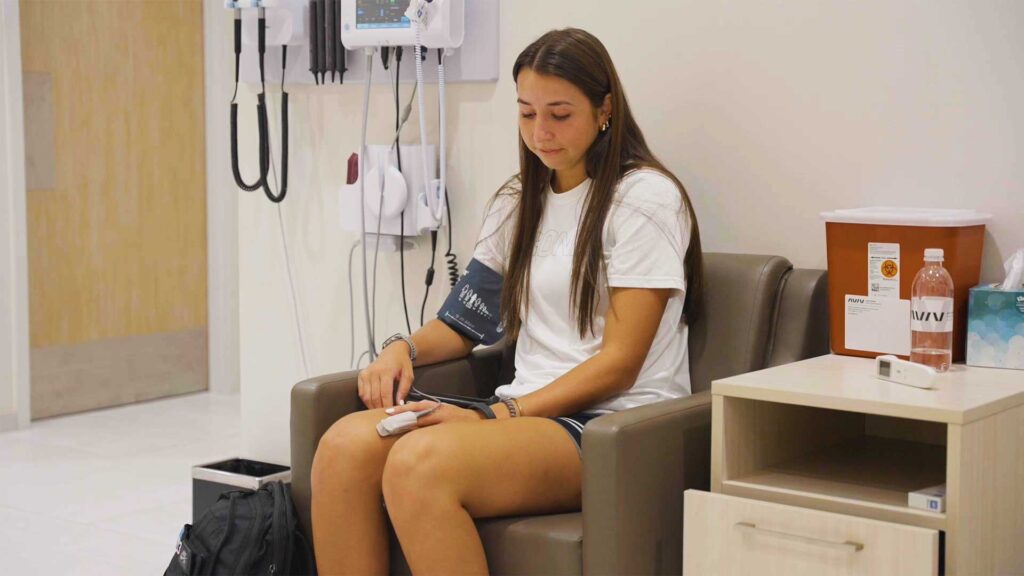
Recovery can be even more challenging for people who have experienced multiple concussions over time. Repeated head injuries can cause cumulative damage and significantly hinder the healing process.
That was part of the reason Caroline’s case was so complex: her brain injuries had stacked up, and her symptoms were no longer following a predictable path.
“Multiple concussions accumulate. It’s not like you have one, you recover, and you completely start from normal when you have the next one,” explains Amir Hadanny, MD, PhD, Aviv Clinics’ chief medical officer and head of research. “When subsequent injuries occur, the brain is more vulnerable, leading to more severe and lasting consequences. This is what we see in Caroline’s case.”
Despite top-tier medical support, Caroline Ducharme’s concussion symptoms didn’t improve. Like many people with PCS, she wondered if she would ever feel like herself again.
That’s what ultimately led Caroline and her care team to consider a different path: one focused on restoring brain health at its core.
Discovering Aviv Clinics: A New Path to Post-Concussion Recovery
When Caroline and her family arrived at Aviv Clinics in central Florida, they were searching for more than symptom relief. They wanted answers and results.
To fully understand Caroline’s challenges, the Aviv Clinics team performed the most thorough medical assessment Caroline had ever received, including:
- High-resolution MRI imaging, followed by
- High-resolution SPECT imaging to measure brain structure and activity
- Scientifically validated objective cognitive testing to measure attention, memory, focus, and processing speed
- Extensive blood tests to examine potential biomarkers
- Gait, power, and balance analysis to evaluate motor function
- Cardiopulmonary exercise test to evaluate endurance, heart, lungs, and muscles.
Caroline’s testing confirmed decreased function in some areas of her brain, confirmed by both imaging and cognitive testing.
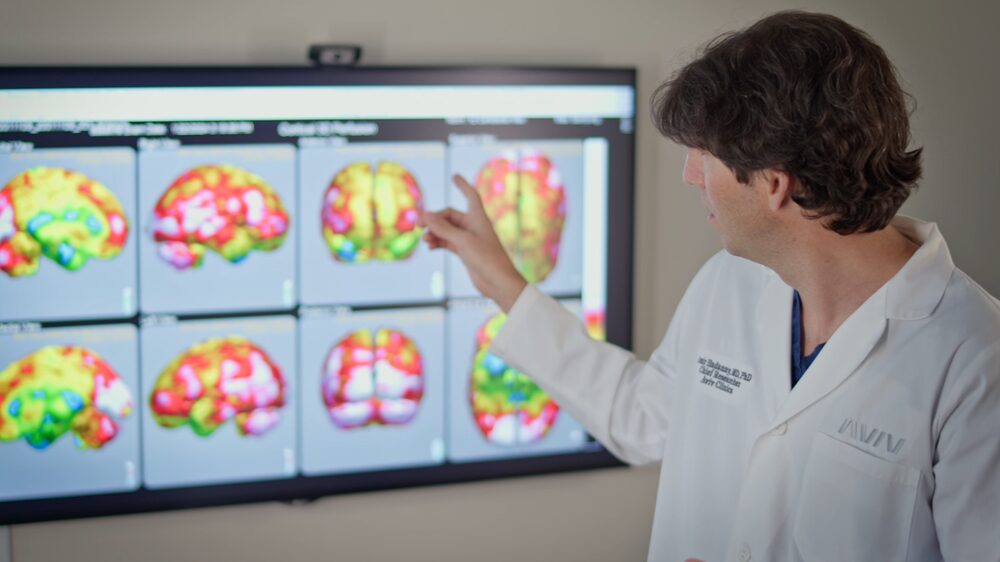
“When we see decreased functioning in multiple areas of the brain, it makes it harder to think through things, to make sense of things,” explains Aviv Clinics head of neuropsychology, Roger Miller, PhD. “And we saw this in her testing, that her processing speed was slow. This is extremely common with concussive injuries.”
After a comprehensive review of her assessment results, the clinical team at Aviv determined that they could make a difference for Caroline, but it would take time.
A Personalized Treatment for Post-Concussion Syndrome
Armed with a detailed understanding of Caroline’s condition, Aviv’s clinical team of physicians, neuropsychologists, physiologists, physical therapists, and other professionals crafted her personalized medical program. Over the next 12 weeks, Caroline committed to a comprehensive regimen of evidence-based therapies, including:
- A scientifically-backed hyperbaric oxygen therapy (HBOT) protocol
- Cognitive exercises and dual-task training
- Physical training and physical therapy
The Aviv Medical Program isn’t a passive therapy or medication that offers instant relief. It requires time and work. As an elite athlete, Ducharme embraced the challenge.
“It’s been really challenging. I didn’t think it would be this hard,” she admitted. “I come home and I’m exhausted and I didn’t really sweat. It’s a different type of exhaustion.”
How Hyperbaric Oxygen Therapy and the Aviv Medical Program Support Brain Recovery
The Aviv Medical Program is rooted in the science of neurorehabilitation and brain plasticity. By breathing 100% oxygen in a pressurized environment, Caroline dramatically increased the amount of oxygen delivered to her brain tissue. Peer-reviewed, published scientific research indicates that the HBOT protocol used at Aviv Clinics promotes the growth of new blood vessels, reduces inflammation, and helps restore function in damaged areas of the brain.
But her two-hour HBOT sessions were only one element of the program. Every day, she met with specialists focused on helping her make the most of these improvements. Customized nutritional guidance, neurocognitive training and physical therapies helped Caroline:
- Improve cognitive speed and clarity
- Reduce headaches and visual disturbances
- Enhance balance and coordination
- Increase energy and stamina
- Elevate mood and emotional resilience
“Brain recovery is hard work. It doesn’t end in a week or two,” says Dr. Hadanny.
“It takes time to create new pathways and new blood vessels. The brain needs time to establish new neural pathways and develop new blood vessels—a complex process that can’t be rushed. Patients often find this journey frustrating because progress isn’t linear. There are inevitable setbacks and breakthroughs, but the overall trajectory is always upward.”
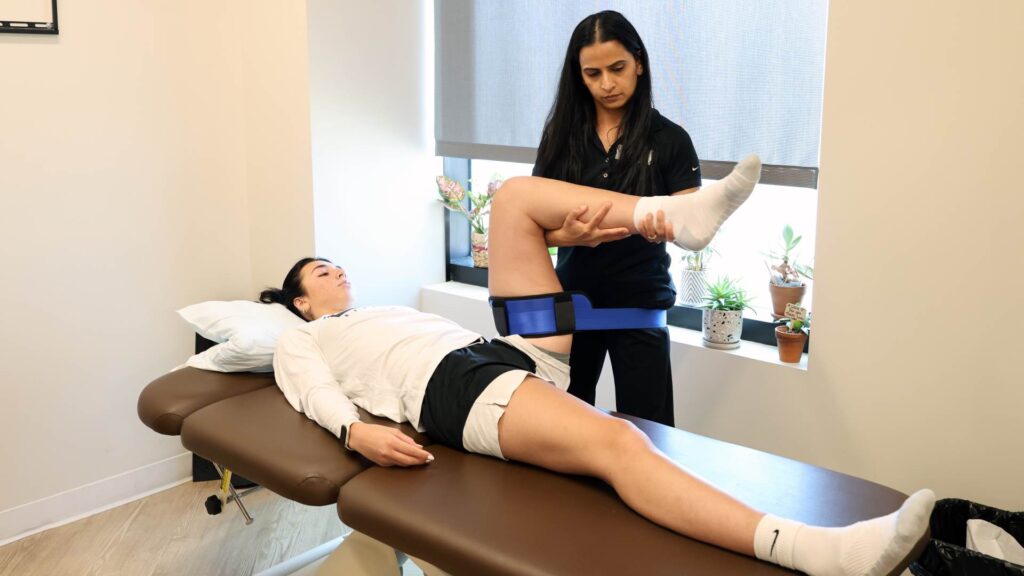
Over time, Ducharme’s symptoms began to ease, and she started to feel more like herself — physically, mentally, and emotionally.
“Coming in, I was definitely a little hesitant to get my hopes up,” Caroline admits. “Now I have a newfound hope for getting back into basketball… and being able to be the player I was, the person I was.”
While Caroline was healthier and more hopeful after finishing the program, she still wasn’t ready to compete. She spent the following months continuing her rehab and gradually rebuilding her confidence and stamina.
The Next Chapter in Caroline Ducharme’s Concussion Recovery Story
By the end of the 2024-2025 college basketball season, Caroline had made enough progress to join her teammates on the court. She made her season debut late in a blowout win against Butler, more than 15 months after her last on-court appearance.
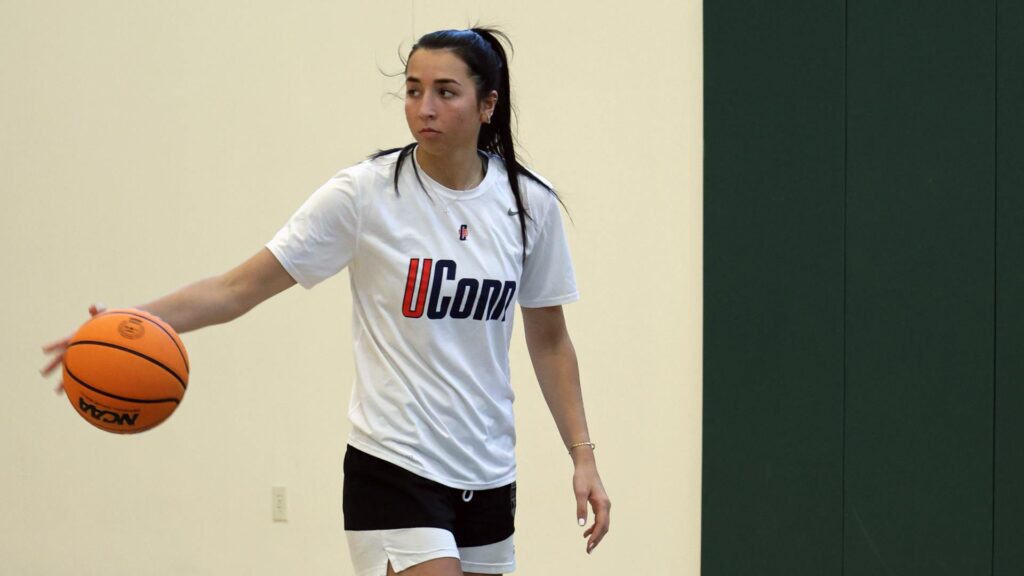
As UConn pushed through the Big East championship and the NCAA women’s tournament, Caroline’s on-court minutes were limited, but her presence was powerful. At the end of the season, she was finally able to achieve one of her lifelong goals, lifting a national championship trophy.
For the first time in nearly two years, she sees a path forward. She recently announced that she’ll return to UConn for her senior season, proof that she believes her dreams of a professional basketball career are still within reach.
“I’m definitely happy with where I am but I’m continuing to get better,” Caroline told CBS Sports in an April 2025 interview. “This is not where I want my story to end.”
A Path to Recovery From Chronic Concussion Symptoms
Although Caroline Ducharme’s story is still unfolding, she’s now back on the court, back in the classroom, and back to pursuing her goal of a professional career in basketball. Her experience is a reminder that recovery from post-concussion syndrome is possible, even after months or years of suffering.
At Aviv Clinics, our evidence-based program is designed to treat people who want answers, real improvement, and the chance to reclaim their lives. Our unique combination of in-depth assessments and multidisciplinary therapies offers hope for people with lingering concussion symptoms.
If you or someone you love is struggling with post-concussion syndrome, contact Aviv Clinics today to schedule a complimentary consultation and discover whether our personalized treatment program is right for you.
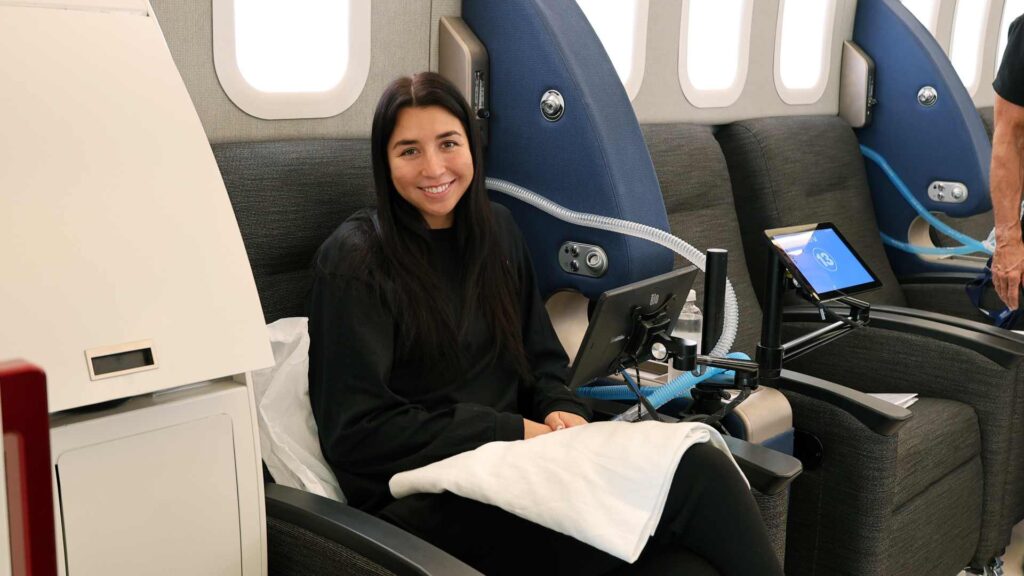
Aviv Medical Program provides you with a unique opportunity to invest in your health while you age
